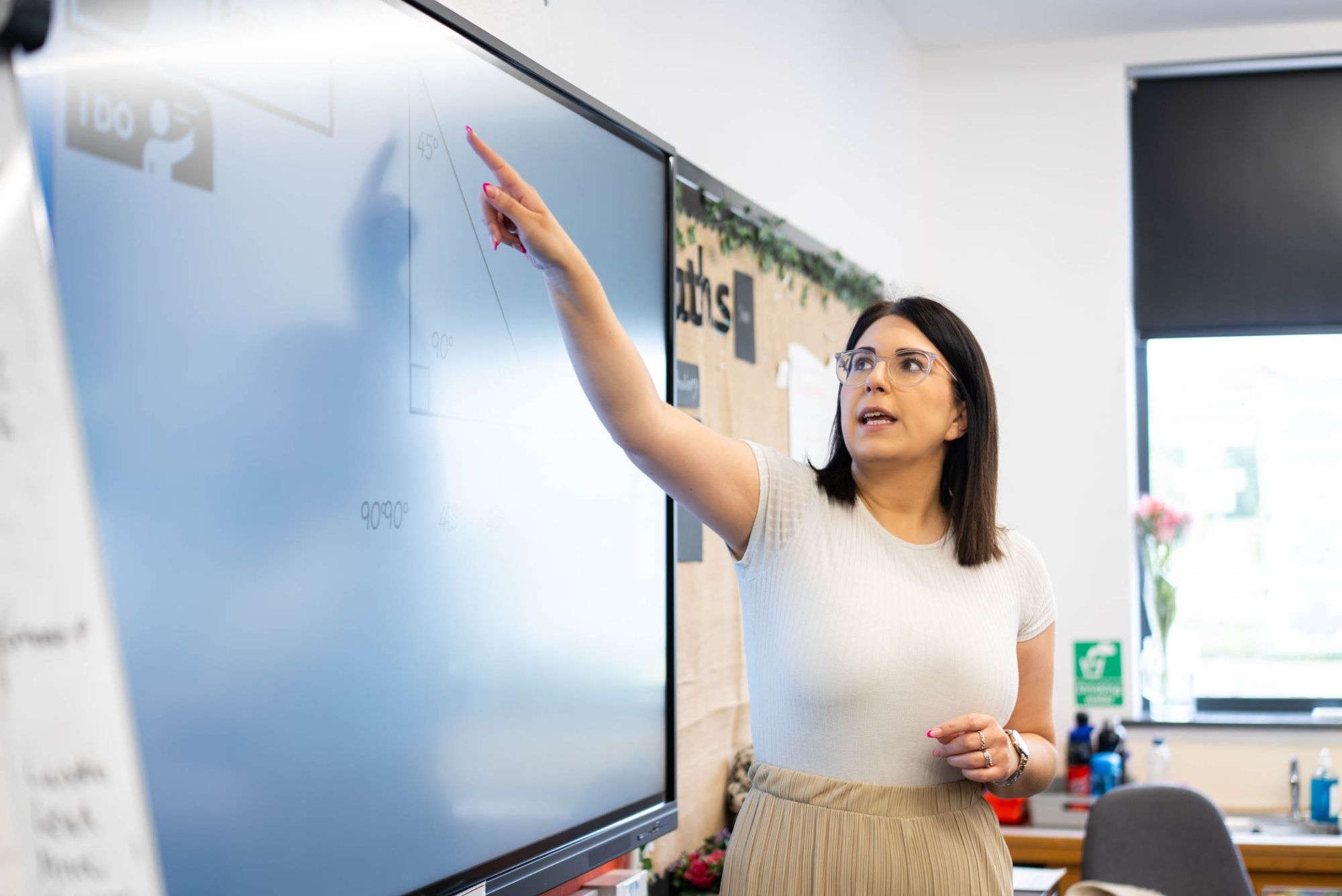Maths
The national curriculum for mathematics aims to ensure that all pupils:
At Hazel Leys, we know that Mathematics is an important discipline that helps us to understand and change the world. Maths is used in all aspects of our daily lives and we aim for our children to understand and be confident when using maths skills, such as interacting with technology or handling money. We want all pupils to experience the enjoyment of Mathematics and develop a sense of curiosity about the subject, with a clear understanding. The knowledge we teach pupils is specified from the National Curriculum and EYFS Framework programmes of study. Our mathematics curriculum is carefully sequenced so that explicit links are made between declarative knowledge (relationship between facts), procedural knowledge (methods and algorithms), and conditional knowledge (reasoning and problem solving). Pupils systematically acquire the knowledge they need to become proficient mathematicians as they progress through each key stage of the school. All knowledge is taught to be remembered so that understanding moves into long-term memory.
Reception to Year 6 use Mathematics Mastery (MM) as the starting point for their planning. The programme is underpinned by three key principles, which we believe are central to strong Maths provision.
1. Conceptual understanding: learning of knowledge is deepened by representing concepts using objects, pictures, symbols and words so that pupils understand the relationship between declarative and procedural knowledge.
2. Language and communication: Mathematical language strengthens conceptual understanding enabling pupils to explain and reason. The more learners use precise mathematical vocabulary, the more they feel themselves to be mathematicians and can be confident in conditional knowledge.
3. Mathematical thinking: developing mathematical habits – to be systematic, generalise and seek out patterns.
This programme of study uses a mastery approach as outlined by the NCETM. Extensive research has shown that this approach provides better outcomes to pupils. We supplement this programme with our own planning and tasks based on the needs of the pupils at our school. In Years 1 to Year 6, the curriculum is consolidated through Maths meetings. These are short 15-minute sessions which take place 2-3 times a week and provide an opportunity for pupils to revisit key areas of declarative or procedural knowledge throughout the year and increase their memorisation of key facts and improve fluency.
Another key idea of the mastery approach is that representations used in lessons expose the mathematical structure being taught. We represent mathematical structures in a variety of ways (concrete, pictorial and abstract) and teachers plan conceptual variation into lessons. The aim is that resources are later removed once understanding is secure.

Intent:
|
Throughout every maths lesson, children are given opportunities to focus on developing a deep and secure conceptual understanding of mathematics, rather than just memorising procedures. They are given opportunities to problem-solve to help students develop the ability to use their knowledge to solve unfamiliar problems and engage in complex reasoning. Our approach offers all pupils access to the full curriculum, believing that everyone can learn and succeed in mathematics. We know that fluency is vital to developing strong mathematical knowledge and the ability to use appropriate vocabulary to explain their thinking. Through the use of ‘talk task’ time built into every lesson, the children have the expectations and thinking processes modelled to develop vocabulary and thinking skills. Maths meetings are designed to strengthen children’s fluency by focusing on key knowledge for each concept taught. Key vocabulary is shared with teachers to ensure a consistency in mathematical language across the school. Maths Mastery also provides extensive professional development, resources, and support to build teachers' subject expertise and confidence. This approach allows teachers to focus on delivering high-quality teaching rather than spending time developing their own resources. At Hazel Leys, staff adapt resources to suit the needs of their classes and tailor each lesson to address misconceptions, gaps and strengths. |

Implementation:
At Hazel Leys, the implementation of the maths curriculum provides for gradual progression between concepts and year groups. Children take part in pre-and post-unit quizzes to assess prior knowledge, gaps and process. Lessons are then adapted and sequenced so that new knowledge and skills build on what has been taught before. Our maths lesson follows a 7-part sequence, which includes Prior Knowledge, Vocabulary, New Learning, Talk Task/Let’s Explore, Develop Learning, Independent Task and Plenary.
By using this structure, children know what is expected of all learners. Every lesson has plenty of opportunities for children to engage in high-quality discussions about maths with teachers and their peers, using the “I do”, “We do”, “You do” approach. Teachers clearly model communication and language expectations using new vocabulary. Task sheets are adapted by staff to ensure every child has an opportunity to become fluent in a range of maths concepts, to apply their learning in different contexts, show their reasoning and problem-solving skills and then are further challenged through step for depth.
One of the key elements in lessons throughout the school is developing the children’s calculation strategies, which include written calculations and mental strategies, as laid out in the calculation policy for addition, subtraction, multiplication, and division. Staff also understand that sometimes children find their own efficient methods along the way. To support us in delivering a high quality, knowledge rich maths curriculum, we consistently use the Concrete, Pictorial, Abstract (CPA) approach to help pupils understand mathematics and to make connections between different representations. We have a range of mathematical resources in classrooms including Numicon, Base10 and counters (concrete equipment).
Based on connectionist pedagogies, staff know that using a range of CPA approaches can lead children to:
- Connecting between different aspects of maths.
- Connecting different representations.
- Connecting children’s methods.
In lessons concepts are represented and modelled in more than one way to draw attention to the critical aspects and to develop deep and holistic understanding.
Children who not making the required progress are given extra support through intervention sessions and support in class to meet our INTENT of developing pupils. Staff also provide feedback during the lesson on children’s learning and achievement in line with our feedback policy.
Maths Meetings
Children will take part in two 15-minute and one-40-minute maths meetings a week where gaps in knowledge, misconceptions and number facts are taught to ensure accelerated progress is made by all pupils. There are no expectations for these sessions to be recorded in books but staff must ensure that maths meetings are targeted at the QLA from the pre and post unit assessments and PiXL assessments.
EYFS
At Hazel Leys, we know the EYFS are building mathematical foundations for all pupils. Our approach ensures that children grasp concepts before moving on to new material. There is a strong emphasis on encouraging and using mathematical language to foster conceptual understanding from an early age. In EYFS, we aim to create positive, engaging experiences with maths for all children, helping them to enjoy and succeed in the subject. Children in the Early Years, take part in daily maths lessons. This is usually done as a whole class in reception and small groups in nursery.
Lessons are supplemented by the maths provision in the indoor and outdoor classrooms. The children are able to engage with a wide range of mathematical concepts in a variety of ways. For instance, measuring could be applied to the water area, small world area, creative area etc. The children are supported through continuous provision to discuss concepts and are challenged using questioning. Staff will also use real life problems to ensure children link their learning in the classroom to the real world.
Every unit of work covers all of the Early Learning Goals (ELG’s) within the Early Years Framework. With children having opportunities to return to skills in order to develop mastery within maths.

Impact:
The impact of this curriculum design will lead to progress across key stages relative to a child’s individual starting point and their progression of maths skills. The impact of our mathematics curriculum is measured in a variety of ways:
- Annual reporting of standards across the curriculum.
- Marking work in books.
- Pre and post unit quizzes.
- PiXL assessments.
- A reflection on standards achieved against the planned outcomes.
- Monitoring and evaluation of the subject throughout the year
- Pupil discussions about their learning, which includes discussion of their thoughts, ideas, processing and evaluation of their mathematical knowledge.
- Staff discussions regarding the embedded curriculum.
The maths lead has a clear role and overall responsibility for the progress of all children in maths throughout school. Working with SLT, key data is analysed, and regular feedback is provided and discussed at pupil achievement meetings to inform on progress and future actions. For this to happen, the mathematics lead, the Principal and the Senior Leadership Team take responsibility for monitoring the mathematics curriculum and the standards of teaching. The subject lead will monitor for appropriate pitch and progression at least once every half term.
By end of the maths curriculum at Hazel Leys, our children will:
- Enjoy mathematics and develop a sense of curiosity about the subject with a clear understanding.
- Have a positive ‘can do’ attitude and promote the fact that ‘We can all do maths!’
- Be able to make connections between mathematical facts and concepts.
- Have a secure and deep understanding of mathematical concepts.
- Know mistakes and misconceptions are considered an essential part of
- Be challenged and explore their mathematics more deeply.


